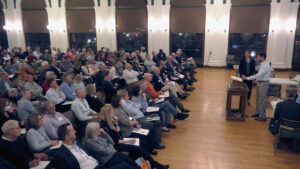 Next Monday, October 30, Town Meeting will consider a vital climate action measure — adopting the Opt-In Specialized Energy Code (Warrant Article 15). As a constituent (or as a Town Meeting member!) you play an essential role in getting the Specialized Code adopted. If you are a constituent and haven’t already done so, please contact your Town Meeting members soon to encourage them to vote to adopt the Specialized Code.
Next Monday, October 30, Town Meeting will consider a vital climate action measure — adopting the Opt-In Specialized Energy Code (Warrant Article 15). As a constituent (or as a Town Meeting member!) you play an essential role in getting the Specialized Code adopted. If you are a constituent and haven’t already done so, please contact your Town Meeting members soon to encourage them to vote to adopt the Specialized Code.
UPDATE: On Tuesday, Oct. 24, the Needham Select Board unanimously voted to support the Opt-in Specialized Energy Code warrant article (Warrant 15). If adopted by Town Meeting, the Specialized Code would take effect July 1, 2024. Warrant 15 is also supported by Needham’s Climate Action Planning Committee (CAPC) and has been endorsed by Green Needham and the League of Women Voters of Needham, who hosted an information session featuring CAPC chair Stephen Frail.
It’s easy to message your Town Meeting Members through the town website. To open the contact form, click here and select your precinct from the list. If you’re not sure of your precinct, you can consult precinct maps here. You just write one message that automatically goes to all the Town Meeting members in your precinct who have signed up for the service.
Here are some reasons why Green Needham strongly supports adopting the Specialized Code.
First let’s clear up a common misunderstanding. The Specialized Code does not have any impact on renovations or additions to your home, only on entirely new construction of a building. Renovations and additions, as always, are regulated by the Stretch Code currently in effect in Needham.
The Specialized Code is an essential means of reducing Needham’s CO2 emissions..
Needham is already feeling the effects of climate change, as exemplified by this summer’s extreme rain event. Extreme weather events are occurring worldwide.
- 64% of our Town’s CO2 emissions come from residential and commercial buildings.
- New buildings will be with us for many decades to come. We want them to be built for the future and contribute to the transition away from fossil fuels.
- As the grid becomes increasingly powered from renewable sources, all-electric homes will help our State reach its zero net energy goals.
The Specialized Code encourages (but does not mandate) all-electric buildings.
- The Specialized Code puts no additional requirements on all-electric buildings.
- The building technology to construct all-electric homes already exists and has been used successfully by many builders.
- All-electric construction with heat pumps costs the same, or less, than construction with fossil fuel heating or appliances. This is because one system does both heating and cooling, gas lines don’t have to be installed, and both state and federal incentives are available. See Question 4 of the FAQs from the Mass. Dept. of Energy Resources.
- All-electric homes have better air quality, avoiding the issues of pollutants, such as carcinogenic benzene, from combustion of fossil fuels in the home.
- Eversource has met with the CAPC and indicated that the capacity is more than enough to support increased electrification. Due to the large size of houses, upgrades of street-level equipment such as transformers will be needed whether or not the Specialized Code is passed.
The Specialized Code would add reasonable additional requirements for new buildings that use fossil fuel.
- The Specialized Code does not ban fossil fuels. For new residential and commercial construction using fossil fuel heat or appliances (mixed-fuel buildings), the Code does mandate solar panels (with some exceptions) and pre-wiring for future transition to electric.
- During the construction stage, when the walls are open, wiring for later transition to all-electric is not difficult and avoids costly retrofits in the future.
- For residences, houses under 4,000 sq. ft. would have to install a minimum of a 4 kW solar system (about 12 panels). Houses greater than 4,000 sq. ft. would have to have enough panels to cover their energy use.
- There are allowances for tree-shaded properties.
- For homes, the cost of solar panels, which is partly covered by federal and state incentives, is a relatively minor cost, given the selling price of Needham newly constructed homes. All the Needham new construction currently listed in Homes.com is over 4,000 sq. ft. and 15 of the 22 homes cost over $2.5 million.
The question of cost. Citing concerns about cost and lack of community involvement, Needham’s Finance Committee voted not to support Warrant 15. As pointed out above, for all-electric construction (which costs the same or less than construction using fossil fuels), the Specialized Code imposes no extra requirements and thus no extra costs.
Construction of a single-family house that uses fossil fuels will involve 1) pre-wiring for future electric transition and 2) installing solar panels, depending on the size of the house. Green Needham believes that these are reasonable and beneficial requirements that reduce CO2 emissions while decreasing energy costs for operating the home.
Affordable housing builders are leading the way on all-electric Net Zero construction for a host of reasons: ultra energy efficient building techniques such as Passive House are particularly economical in multi-family buildings; there are additional state and federal incentives for all-electric affordable housing building projects; tenants in affordable housing in particular benefit from the lower heating and cooling costs from all-electric Net Zero homes; protecting residents from future costly home heating retrofits is the right thing to do.
This summer, a report commissioned by the Home Builders & Remodelers Association of Massachusetts made headlines that suggested that the Specialized Code will add $10,000 – $23,000 to the cost of home construction. This report (sometimes referred to as a MIT/Wentworth study) had many flaws, including not taking green building incentives into account in upfront cost estimates and comparing the Specialized Code to the obsolete Stretch Code, not the current Stretch Code (which has the same energy efficiency requirements as the Specialized Code). Read more.
Lost in the headlines about the report was that the authors actually are in favor of adoption of the new code. One of the authors reported at a State House briefing that, “Adoption of the opt-in specialized code is crucial to helping Massachusetts achieve statutory emissions reductions by requiring pre-wiring of new mixed fuel homes and avoiding higher cost future electrification retrofits . . . . The opt-in specialized code requirement that multifamily housing achieve Passive House standards will significantly reduce carbon emissions from those buildings in addition to delivering health benefits to residents.”
Please make your voice heard about this important decision. Climate change is here, and the time to act is now!

